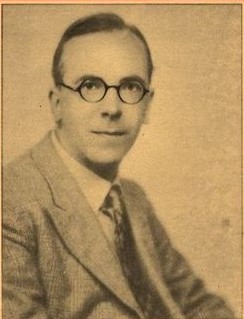Vocal Music
- There’s a Voice in the Wilderness – Craig Phillips (b. 1961)
Instrumental Music
- Benedictus – Alec Rowley (1892-1958)
- Partita on Comfort, comfort, ye my people (PSALM 42) – Johann Pachelbel (1661–1733)
- Prepare the Way, O Zion – Paul Manz (1919-2009)
Congregational Music (all hymns from the Hymnal 1982 with the exception of those marked “R” which are from Renew.)
- Hymn 76 - On Jordan’s bank the Baptist’s cry (WINCHESTER NEW)
- Hymn R128 - Canticle 16 – The Song of Zechariah: Blessed be the God of Israel (FOREST GREEN)
- Hymn 67 - Comfort, comfort, ye my people (PSALM 42)
- Hymn 60, st 6 - Creator of the stars of night (CONDITOR ALME SIDERUM)
- Hymn R152 - I want to walk as a child of the light (HOUSTON)
- Hymn R92 - Prepare the way of the Lord (Taizé Community)
- Hymn 65 - Prepare the way, O Zion (BEREDEN VAG FOR HERRAN)
The offertory is an anthem setting of a hymn that is in our hymnal, but has probably never been sung in our church. Here's the story behind it.
In 1925, the Congregational, Methodist, and Presbyterian churches in Canada united as the United Church of Canada. To celebration this union, the journalist and poet
James Lewis Milligan wrote the hymn, There's a voice in the wilderness crying. It's a paraphrase of the passage from Isaiah 40. In 1938, the committee for the Hymnal for the Anglican Church in Canada wanted to use this text, but could not come up with a suitable tune. Hugh Bancroft, then organist and choir master at All Saints Church, Winnipeg, was hosting the group in his home, and he told about the struggle to find a fitting melody.
Each one they tried was poor indeed. I suggested that I should go down to the basement, where there was a piano, and see if I could evolve something better. I came up about a half an hour later with a rough sketch of the tune, ASCENSION.
The resulting tune was folk-like in its form and simplicity, and its union with the poem by Milligan has been so successful that it has been included in ten different hymnals, including The Hymnal 1982.
Our choir sings an arrangement of this hymn by the California composer and church musician, Craig Phillips. Phillips preserves the rustic feel of the folkish melody.
As you know, each Sunday we sing a Psalm that is part of the lectionary readings for the day, but this year, three of the four Sundays in Advent designate a Canticle be sung instead of a Psalm. (A Canticle is a hymn or chant, typically with a biblical text, forming a regular part of a church service. The most common Canticle is
Glory to God in the highest (Gloria in excelsis), which is Canticle 6 (Rite I) or 20 (Rite II). The canticle for Advent II is Canticle 4 or 16,
The Song of Zechariah (
Benedictus Dominus Deus). That's why I am playing a piece called
Benedictus for the opening voluntary. However, it is not based on the canticle, but on two lines from a poem by Christina Rossetti, a litany of praise entitled: "All Thy Works Praise Thee, O Lord: A Processional Of Creation". Those two lines are
I bring refreshment — I bring ease and calm.
Because so much of Rossetti's poetry is Christian, one can assume that Rossetti is talking about Christ. But in this poem (very much like a canticle, actually), Rossetti has each individual piece of creation sing a three line hymn of praise, starting with seraphs, cherubs, angels, heavens, sun, moon, comets, winds, fire, heat, winter, spring, frost, night, light, thunder, clouds, until we finally get down to Medicinal Herbs, who sing:
I bring refreshment,—
I bring ease and calm,—
I lavish strength and healing,—
I am balm,—
We work His pitiful* Will and chant our psalm.
Alec Rowley was an English composer, organist, and pianist who taught composition at Trinity College in London. His name was known to many through his writing and through the many educational pieces that he wrote, staple fare for many a beginner or amateur player. His more demanding work as a composer has been unfairly neglected, save for the music he wrote for choirs and organ.
 |
| Alec Rowley |
* at Rossetti's time, 'pitiful' still had the alternate meaning of 'compassionate.'


